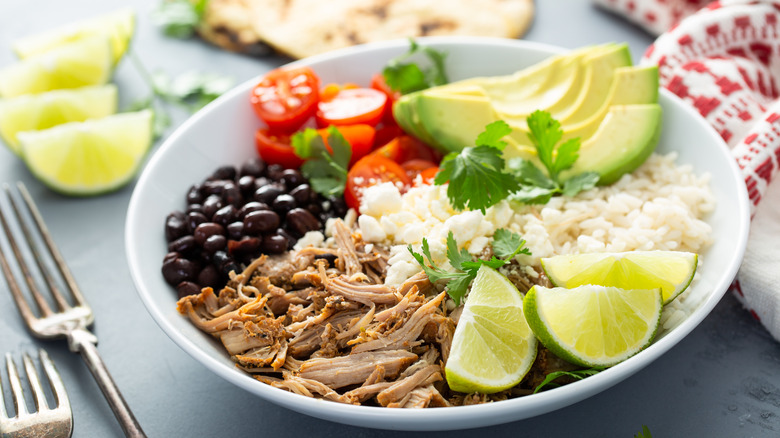The Key Ingredient In Chipotle's Carnitas Adds An Aromatic Punch
While Chipotle's "53 real ingredients" hasn't permeated popular culture quite like Baskin-Robbins' collection of 31 original flavors, the fast-casual chain is certainly proud of its use of fresh, whole foods at its 3,400-plus restaurants in the U.S., Canada, and Europe. All of the herbs, oils, produce, and proteins are pictured on the company's website in the form of a simple overhead shot. Unless you've spent time combing through that site, you likely didn't realize what ingredient makes Chipotle's carnitas so incredibly fragrant. It's actually juniper berries, which, compared to their size, pack an incredible punch when it comes to both aroma and flavor.
When you think of juniper berries as an ingredient, gin is most likely the product that comes to mind. The resinous property of these female seeds, whose structure is actually closer to that of a fun-sized pine cone rather than a berry, lend the spirit its signature piney taste. But like many botanicals, they can find their way into any number of recipes — the pungent nature of juniper berries allows them to stand up to gamier meats like venison and rabbit, though they are just at home in a cookie that requires some heady flavors, such as allspice or nutmeg. According to Chipotle, the juniper berries that are used in the carnitas spice blend are the real deal — "no added flavors or juniper-berry-like substitutes." The result is beautifully braised, hand-shredded pork that's been infused with the essence of fresh pine boughs.
Experiment with juniper berries at home
Thanks to Chipotle's ingredient transparency, you could easily recreate the restaurant's carnitas at home. Additional components listed as part of the carnitas recipe on its website include bay leaf, thyme, salt, and sunflower oil. Either pork butt or shoulder will work just fine. Just give the meat a quick stove-top sear before allowing it to nestle with the herbs in a slow cooker until fork tender. Juniper berries are sold in the spice section at most grocery stores, or you can order them online. However, if you happen to live in a part of the country where the common juniper naturally grows — that includes the East Coast from New England to the Carolinas, parts of the Great Plains, and western states like Oregon, Idaho, and Washington — you can source directly from nature by foraging the cones (which look like orbs).
With your new haul of berries, whether the result of picking them off the squatty conifers or plucking them from a supermarket shelf, go ahead and experiment with both dishes and drinks that go beyond Chipotle's carnitas. The woody-sweet scent of the juniper berries doubles down on the rustic comfort of a hearty chili. And if you're a fan of gin, using juniper berries as a garnish for a gin and tonic or any other cocktail that requires them, would naturally enhance their peppery notes.

